From Cher To Zappa: The Wrecking Crew Pt. 2 (Interview)
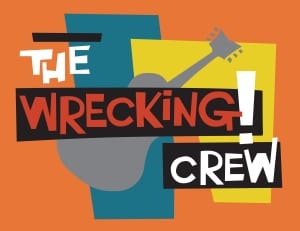 Here is part two of our interview with film director Denny Tedesco. Denny directed The Wrecking Crew, the story of the LA session musicians who anonymously played on just about every hit record recorded in LA during the 1960s including those by The Beach Boys, Frank Sinatra, Glen Campbell, Paul Revere & The Raiders, The Byrds and Sonny & Cher, to name just a few. Denny’s father, Tommy Tedesco was a session guitarist and a major player among The Wrecking Crew along with drummer Hal Blaine, bassist Carol Kaye and keyboard player Leon Russell. The film has been in production for 20 years and has finally gained wide distribution after Tedesco was able to raise enough money to pay for the music rights…an earlier cut was shown at selected festivals in 2008. The 13th Floor’s Marty Duda spoke to Denny Tedesco at length about the making of The Wrecking Crew, a film the grew from being about a group of musicians, into something much more personal. In part two,Denny tells us how he got Cher and Frank Zappa to agree to be in the film.
Here is part two of our interview with film director Denny Tedesco. Denny directed The Wrecking Crew, the story of the LA session musicians who anonymously played on just about every hit record recorded in LA during the 1960s including those by The Beach Boys, Frank Sinatra, Glen Campbell, Paul Revere & The Raiders, The Byrds and Sonny & Cher, to name just a few. Denny’s father, Tommy Tedesco was a session guitarist and a major player among The Wrecking Crew along with drummer Hal Blaine, bassist Carol Kaye and keyboard player Leon Russell. The film has been in production for 20 years and has finally gained wide distribution after Tedesco was able to raise enough money to pay for the music rights…an earlier cut was shown at selected festivals in 2008. The 13th Floor’s Marty Duda spoke to Denny Tedesco at length about the making of The Wrecking Crew, a film the grew from being about a group of musicians, into something much more personal. In part two,Denny tells us how he got Cher and Frank Zappa to agree to be in the film.
Click here to listen to part two of the interview with Denny Tedesco:
Or, read a transcription of the interview here:
MD: Yeah. How hard was it to get Cher on board with this?
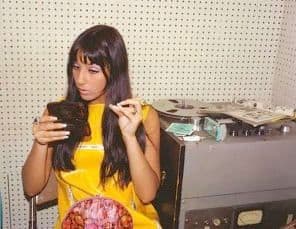
DT: Well Cher is an interesting thing cause in 19…in the 80s I worked on a Cher video and it was one of those rock and roll videos that she, when she had one of her other hits, and I remember standing next to her, I said, ‘Cher my dad worked with you’. And she goes, ‘who’s your dad’? I said well, Tommy Tedesco and she goes oh my God, Tommy and Hal and…so she became like this… not Cher, but a young girl.
MD: Right.
DT: So I knew I had a chance. So when the time came we knew the agent and I think the agent just did it out of respect for us, at least she asked.
MD: Yeah.
DT: She probably wouldn’t have asked for other people and Cher came back and said yes. When the agent called us and said, ‘she said yes!’ You could hear it in the agent’s voice that she said yes was a surprise.
MD: Right.
DT: But anyway we had a chance. Don’t forget Cher was 16, Brian Wilson was 19.
MD: Yeah.
DT: Everybody in this time period, Herb Alpert, all these people, if you get to them, past the gatekeeper, they’re into it because it was the best time of their lives.
MD: Yeah, and I think the most…
DT: The ones that turn me down, Michael Nesmith turned me down early but Michael Nesmith came around in the end.
MD: Yeah.
DT: The other ones that turn me down, I’m glad they turned me down but again, I don’t know if its them or their camp.
MD: Yeah.
DT: Was Tom Petty which I was surprised because of his love of that world.
MD: Right.
DT: Bonnie Raitt, I was surprised because of her background and she had worked with Earl (Palmer) and a couple of the others.
MD: Yeah.
DT: And the other one was Max Weinberg. But in the end…so I’m glad it didn’t happen.
MD: I think the most surprising person I saw in there was Frank Zappa, it was fantastic.
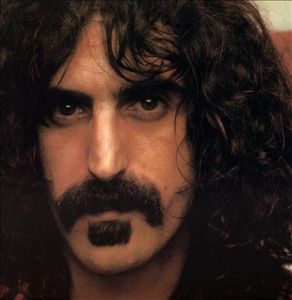 DT: Theres a good reason for Frank Zappa. What happened was, I said earlier I wanted to do the story about ‘The Wrecking Crew’, two things happened. In 1981 I was in college and one of my producers, John Leonoudakis, wanted to do this project for school and wanted to do this. What we would do is a story about dad or his session musicians or a choreographer or someone that was well respected among their peers. So we did it about my dad and it wasn’t that good at all. So, but we did Frank Zappa, we did Henry Mancini and it was okay, it was 23 minutes, it played on PBS here but it was not good at all.
DT: Theres a good reason for Frank Zappa. What happened was, I said earlier I wanted to do the story about ‘The Wrecking Crew’, two things happened. In 1981 I was in college and one of my producers, John Leonoudakis, wanted to do this project for school and wanted to do this. What we would do is a story about dad or his session musicians or a choreographer or someone that was well respected among their peers. So we did it about my dad and it wasn’t that good at all. So, but we did Frank Zappa, we did Henry Mancini and it was okay, it was 23 minutes, it played on PBS here but it was not good at all.
MD: Right.
DT: We were college students. I showed Frank the Gong Show footage thinking Frank was going to tell me something funny. Well Frank, I didn’t realise, I had a different idea what Frank Zappa was, he’s not funny, he’s a very serious dude. He’s iconic or ironic or sarcastic or whatever you want to call it, but he’s not a funny dude. So when he gave me those words on that tape I went, oh that sounds good, and It was in the film but it was end of the other film but never meant much to me. So when this film came around I went oh my god Frank Zappa laid that out to me 30 years ago, this is perfect. That’s why it looks different as it’s shot differently, it’s a 3 quarter inch tape, everything else…
MD: Right, yup. Was it a problem mixing all the formats with the aspect ratio and all that? Did you have thoughts about blowing it up and doing whatever?
DT: Yeah after a while you just give up. The good thing about, because it’s a documentary I think again no one was really, I thought that we were going to be really concerned about it and wanting us to blow it up into 16:9.
MD: Yeah.
DT: Letterbox, everything. But they said no, don’t worry about it, there’s multiple formatting. Which maybe 10 years ago it might have been a different situation.
MD: Yeah.
DT: Because I think now people are used to seeing different formats on Netflix and all these other documentaries. Its funny cause my interviews, even though they’re 10 years old, they’re before Hi-Def, they’re considered vintage now.
MD: Yeah, it doesn’t take long that’s for sure.
DT: No it doesn’t.
MD: And who did you say you were making the film for when you were… It is for yourself, for the other musicians or….
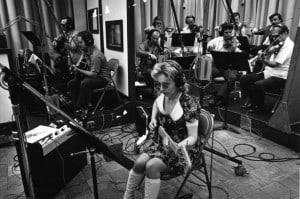 DT: I wanted to make a film to tell the story about the musicians. I wanted to go back to what I was saying…and then we had 30 minutes cut and a friend of mine, editor, director looked at what we were cutting and said why are you guys cutting it like this? I said, ‘what do you mean’? He says, ‘it’s a history doc channel, cut’.
DT: I wanted to make a film to tell the story about the musicians. I wanted to go back to what I was saying…and then we had 30 minutes cut and a friend of mine, editor, director looked at what we were cutting and said why are you guys cutting it like this? I said, ‘what do you mean’? He says, ‘it’s a history doc channel, cut’.
That was so insulting but it was, he’s saying you have something that none of us editors in this building have, an insight to this story that you’re not touching. And the reason I wasn’t touching it, being the son of the characters, was I didn’t want anybody to know. I wanted to make a really good documentary and tell the story and, it’s almost like saying I didn’t get this job because I’m the son…I’m a great director. So my ego was preventing me from going there. So finally I realised he was right and then once we did that, we went down that angle it was much easier to cut because now as you know as an editor, there’s thousands of different ways of doing it but for me it was like okay you know what I don’t have to, If I need a lighter moment I can go to my father and not feel guilty about it.
MD: Right, and you can also use your own narration to kind of tie things together.
DT: Exactly, and then that was the other thing…the narration in the beginning, when we did that, one of the problems we had and when we sent it to Sundance, we didn’t get in. It was a rough cut and we realised we had a long shot, I just didn’t want to keep going. But I get a call from HBO and they said Sundance told us about your film, we’d love to see it. I said oh cool, wow we didn’t make it to Sundance but they told us. So I called the guy and he says here’s problem, out of 700 films, you’re in the top 25. He says but the problem we have with your film was is it a story about your father or is it the story about ‘The Wrecking Crew’? And that was one of the notes that kept coming back in few of the screenings. I was telling a friend of mine who’s not a film maker about it, he says why don’t you just start it off with this is the story about my father and his extended family ‘The Wrecking Crew’? I went oh, alright, I’ll try that! I never got that note again.
MD: Very good.
DT: Like it sounds silly but it was like. yeah I’ll stoop that low but it worked.
MD: Well that’s laying it right out there in the beginning and then you can take it wherever you want to, I guess. I was reading somewhere, where a couple of years ago people were saying music documentaries just don’t make any money, there’s no point in making them. Is that still the case now, was that the case?
DT: Well again, I’ve said that, it was in 2009 there was an article in Variety talking about the struggles of music docs and they were talking about Scorsese with his Stones doc.
MD: Right.
DT: Demme with the Neil Young doc and then they had me in there and this time, the director Denny Tedesco with ‘The Wrecking Crew’ docs struggling to get licensing, I went oh my God, I’m on the same page as these two struggling directors and they called me director! Circle my name. The problem is people, they have to…yes and no…it’s going to always be that way, you have to pay for certain things, you have to pay for music, I got a great deal on the music and it still was costly.
MD: Yeah.
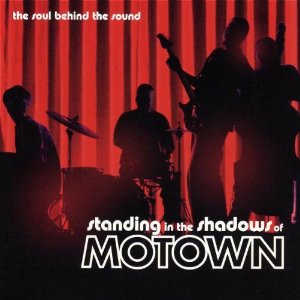 DT: People have to understand it is what it is, it’s whatever the market can bare. Now I thought Standing In Shadows which came out 6 years after I was already going would help me because it was so successful.
DT: People have to understand it is what it is, it’s whatever the market can bare. Now I thought Standing In Shadows which came out 6 years after I was already going would help me because it was so successful.
MD: Yup.
DT: It didn’t hurt me, but it didn’t really help me cause I’d never played into it, I tried to play into that when I was budgets and stuff, they made millions of dollars of Lions Gate and then 20 Feet From Stardom.
MD: Yeah.
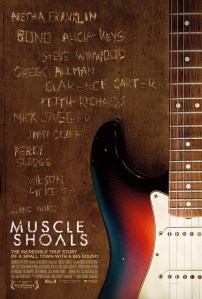 DT: Then Muscle Shoals and I’m still, what do you call it, the step-sister over here. I think the success of theirs helped Magnolia to decide, okay you know what, Muscle Shoals survived, all we have to do is see what this does.
DT: Then Muscle Shoals and I’m still, what do you call it, the step-sister over here. I think the success of theirs helped Magnolia to decide, okay you know what, Muscle Shoals survived, all we have to do is see what this does.
MD: Your film is being shown at the Film Festival here in Auckland next month and I think that’s one of the big attractions of the Film Festival has become over the years Is what are the music films going to be this year, there’s yours, there’s the Amy Winehouse one and theres one about The Who. So it’s a thing that people look forward to.
DT: Again, I wonder if, you’re American, you know what it’s like living there, I think they have more respect for a lot of these music docs.
MD: Yeah.
DT: But then again, I think it all comes down to numbers.
MD: Yeah.
DT: One of the companies that turned us down was RiverRock I think it was. It got from the top down, the tops loved it and when we got to the pencil pusher, the guy says it’s not going to make money, it is a niche film. And when that note came back to me I said fuck that, it’s a niche film? I said you know what, book any city in this country but don’t book New York, Nashville, Chicago or L.A, that’s too easy. I said at that point don’t forget I’ve been seeing this film…in small or large cities, I was selling out, I get people flipping out at that point. So it’s not like, I know what to expect, so don’t tell me it’s a niche film. I got 30% musicians come in because they’re easy.
MD: Right.
DT: If you can get them to know about it, they’re coming, but if you get on talk radio, here in America, I’m done, I’m in, because its 60 plus demographic.
MD: Gotcha, yeah.
DT: Or if I get on NPR you know what I mean, you get on radio or you get a newspaper article, you’re in there.
MD: Yeah.
DT: My Twitter feed doesn’t do that well, you know what I mean?
MD: Right. I hear you.
DT: I got followers and I don’t know who the hell they are.
Click here for more information about The Wrecking Crew screening at the NZIFF.
- Challengers – Dir: Luca Guadagnino (Film Review) - April 24, 2024
- Civil War – Dir: Alex Garland (Film Review) - April 9, 2024
- Pearl Jam – Dark Matter (Monkeywrench/Republic) Album Review - April 1, 2024
